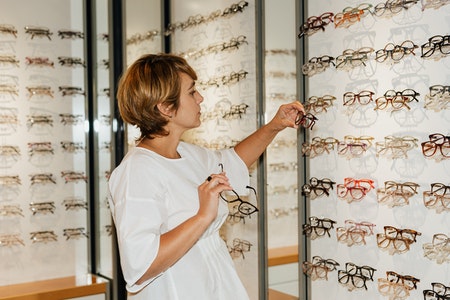Can you see yourself working as an optician? If so, be aware that although you can get a job in this field with only a high school diploma and either an apprenticeship or learning on the job, senior positions may be more accessible with a degree or certificate in opticianry. Some states also require you to pass a licensing exam, so be sure to research how to become an optician in your state.
 |
Optician Qualifications and Responsibilities
Opticians are eye care professionals who select and fit contacts and eyeglasses for patients. After an ophthalmologist writes a prescription, dispensing opticians take eye measurements and determine how a patient's occupation, lifestyle and facial features affect his or her eyewear needs. On-the-job training or an apprenticeship can provide the training needed to begin working in this profession; however, some aspiring opticians choose to pursue certificates or degrees in the field. Licensure is required in some states, and employers may prefer to hire those who are certified.
| Required Education | High school diploma with on-the-job training or apprenticeship; certificate, associate's degree or bachelor's degree in opticianry for career advancement |
| Other Requirements | State licensure and/or certification |
| Projected Job Growth (2019-2029)* | 4% for opticians |
| Annual Median Salary (2019)* | $37,840 for opticians |
Source: *U.S. Bureau of Labor Statistics
Required Optician Education
While there are no specific optician education requirements, an associate's or bachelor's degree in opticianry may offer a competitive advantage. An optician degree is an excellent starting point for those wishing to get into the job market. Opticianry courses educate students in the anatomy and physiology of the human eye, optical fundamentals and refraction. Through clinical training, students also have opportunities to learn about polishing, hand beveling, heat treatment, tinting and fitting glasses. For an optician, entry level education is important, although some on-the-job training will also be provided.
While licensing requirements vary by state, some states mandate that applicants pass a practical or written examination. Employers may require prospective opticians to be certified by the American Board of Opticianry and National Contact Lens Examiners.
Optician Job Duties
Opticians are responsible for using precision equipment to measure various eye features, including corneal thickness and pupil distance. Patient information is then provided to lab technicians to create properly fitted frames.
Opticians also make suggestions about frame shapes, styles and colors, lenses and special lens coatings, such as anti-glare materials. Some opticians are also responsible for grinding and tinting lenses, repairing glasses and fitting contacts.
Some offices may require opticians to perform front-desk duties and fill out insurance claims. Strong customer service skills and a professional appearance are also mandatory.
Optician Employment Outlook
Opticians work in eyeglass stores or with ophthalmologists in medical offices. While many offices are generally open during normal business hours, some retail outlets may require employees to work nights and weekends.
According to the U.S. Bureau of Labor Statistics (BLS), job prospects are expected to rise 4% between 2019 and 2029, because of the aging U.S. population and their need for eyewear (www.bls.gov). As of 2019, the BLS reports that the median salary for dispensing opticians was $37,840.
More Statistics
| Top Employers | Annual Mean Salary |
|---|---|
| Equipment and Supplies Wholesalers | $61,840 |
| Employment Services | $54,900 |
| Colleges and Universities | $50,020 |
| Medical Equipment and Supplies Manufacturing | $49,040 |
| Highest Paying States | Number of Optician Jobs (2019) | Annual Mean Salary |
|---|---|---|
| New Jersey | 1,720 | $61,520 |
| Connecticut | 600 | $56,360 |
| New York | 2,840 | $54,670 |
| Alaska | 130 | $54,110 |
Important Qualities for Opticians
Important skills and qualities for opticians to cultivate and learn include the following:
- Attention to detail
- Customer service skills
- Excellent listening and communication skills
- Strong understanding of how to select eyewear given various considerations
- Good manual dexterity
In some cases, these are skills that you will learn or improve at while you are working as an optician or undergoing an apprenticeship. They are all good things to keep in mind, both while considering whether this career is for you and when going through your training.
Optician: Similar Professions
There are a number of jobs that are similar to the work that opticians do. If you find some aspects of becoming an optician interesting but are unsure if the career is for you, consider looking into other similar jobs like the ones listed below. Keep in mind that the education and training requirements for these careers may be very different from the education you will need to become an optician.
- Audiologists do similar work to opticians but focus on hearing
- Medical appliance technicians design and produce assistive medical technologies
- Optometrists have more face to face patient interaction, but require significantly more education
- Prosthetists specialize in building and fitting prosthetic limbs
Jobs in this rapidly growing field offer a unique mix of technological work and customer interaction. Not only are you working with delicate equipment to create corrective lenses, but you'll also help find the best eyewear fit for the client's needs and lifestyle. Education and training opportunities can help you obtain certification and find work more easily.








